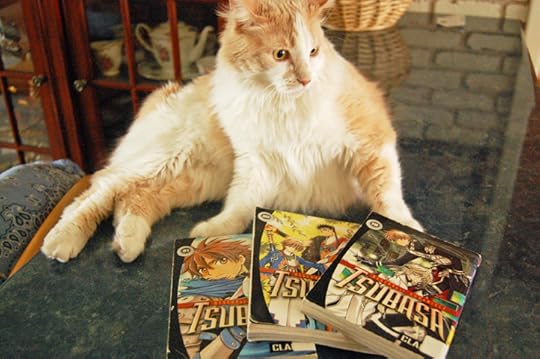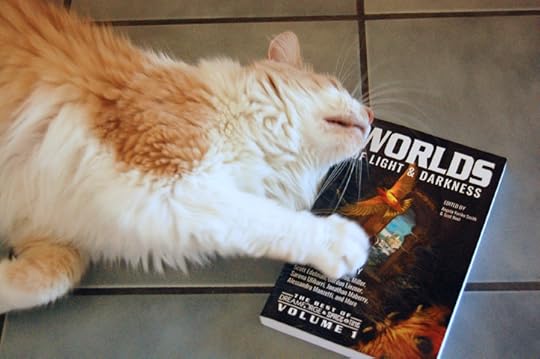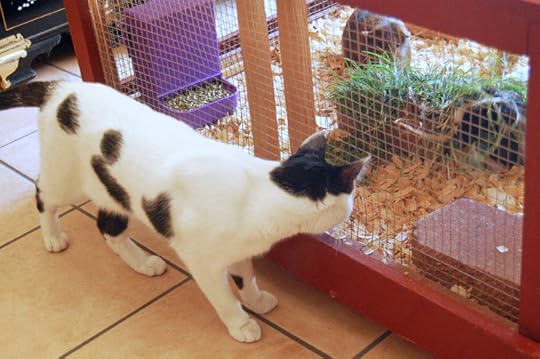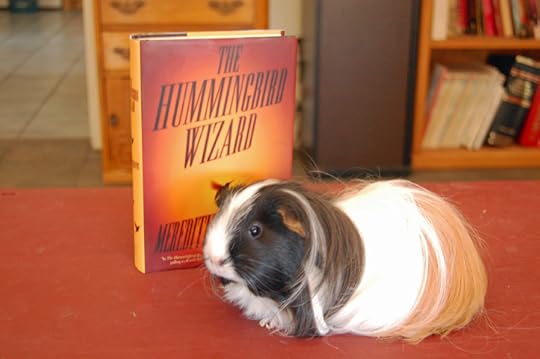Jane Lindskold's Blog, page 44
June 11, 2021
FF: Wise Fools

In addition to the books below, I also have been re-reading my own Curiosities (a short story collection) and Wanderings on Writing as preparation for the interview with Geeks Guide to the Galaxy that I did yesterday. Interesting, re-reading both, as I’m distant enough from the material to almost read it as a stranger might.
For those of you unfamiliar with this column, the Friday Fragments lists what I’ve read over the past week. Most of the time I don’t include details of either short fiction (unless part of a book-length collection) or magazines. The Fragments are not meant to be a recommendation list. If you’re interested in a not-at-all-inclusive recommendation list, you can look on my website under Neat Stuff.
Once again, this is not a book review column. It’s just a list with, maybe, a bit of description or a few opinions tossed in. And it’s also a great place to tell me what you’re reading.
Recently Completed:
Bloodline by Dick Francis, actually by Felix Francis, his son. Audiobook. A FF Reader recommended author!!! He did a pretty good job, but his protagonist was too clueless for my taste.
Tsubasa Reservoir Chronicles by Clamp. Manga. Issues 18-28. An ambitious if not completely successful story. I’m familiar with the first part of the story, because I just re-watched the anime, but it ended before the story did, and I felt drawn to finish it. I’ve read it before, so I guess they were successful in that I wanted to read it again.
In Progress:
Fool’s War by Sarah Zettel. I read this when it first came out and very much enjoyed. Despite the title, SF, not Fantasy.
In the Frame by Dick Francis (Really by him, not by his son, Felix). Audiobook. I’m a sucker for stories that feature art, and the author’s note about how he came to write this one was fascinating. Enjoying very much.
Also:
Still dipping into various sadly neglected magazines.
June 9, 2021
Behind the Interview

Most of the time, when I talk about my life as a writer, I talk about the writing. This week, here’s a behind the scenes glimpse at what goes into another aspect of my life: doing interviews.
There are many sorts of interviews. By now I think I’ve done them all, most often as the one being interviewed, but sometimes as the interviewer. Print interviews, especially these days, are often done, not with give and take, but with the “interviewed” being sent a list of questions and being asked to answer some or all.
Print interviews done this way definitely have pros and cons. On the positive side, the “interviewed” has a great deal of control of the finished interview. On the negative side, the “interviewer” often uses the same very generic questions over and over. This tends to lead to interviews with a flat sameness. This sameness is probably useful if someone wants to do an article on “Twenty Authors Answer ‘Where Do You Get Your Ideas?’” but isn’t my idea of fun to either do or to read.
When I interview someone, especially if via e-mail, I only send a few questions in the first round, so that I can then respond to the answers and ask new questions that are direct responses to what the person being interviewed has said. In this way, we avoid falling into rote.
Another sort of interview is the in-person interview. With the growing popularity of podcasts, these are becoming more common. There are two forms of this interview: the live and the pre-recorded. Each has advantages.
Live interviews are a bit like roller coaster rides. You get the pauses, the ums and ahs. The unexpected laughter. The occasional blooper. If the speakers are good, live interviews are terrific. If the speakers are inarticulate or under-prepared, then they’re deadly.
Pre-recorded interviews tend to be smoother because the dead air time has been taken out. Rambling answers can be trimmed, complete disasters removed entirely. What pre-recorded interviews lack in unpredictability, they gain in polish. If the editor (who is often the same person who does the interview) is good, a pre-recorded interview still maintains the sense of spontaneity.
As with print interviews, a great deal rests on the interviewer. Some simply ask the same questions. I’ve done interviews where I quickly become aware that not only hasn’t the interviewer read any more of the book in question than the jacket copy (interviews are frequently tied to new releases), but also the interviewer hasn’t read anything of mine at all. In those cases, I’ll speak at greater length, filling in the elements that the interviewer should have covered.
Usually, I prefer not to see the questions for in-person interviews in advance, because then my responses won’t be as from the heart. However, this doesn’t mean I don’t prepare. I try to anticipate general questions, and think of examples. For example, “Where do you get your ideas?” can be tightened to become “Where did you get the idea for The Firekeeper Saga or the Overwhere books?” by how I answer it.
Tomorrow (Thursday), I’ll be recording an interview for the podcast “The Geek’s Guide to the Galaxy” with David Barr Kirtley, which appears on Wired.com. He’s picked an interesting topic: my short story collection Curiosities, as well as my book on writing, Wanderings on Writing. I haven’t dealt with these very often in interviews, so it should be fresh and exciting.
I’ll let you know when the interview airs. In the meantime, there are links to some older interviews I’ve done at my website: www.janelindskold.com. You might enjoy.
Any questions?
June 4, 2021
FF: Selections From…
 Persephone Revels
Persephone RevelsFeatured in the picture is the new anthology, Worlds of Light and Darkness, which combines a selection of stories taken from DreamForge and Space and Time magazines. I wrote the introduction in which I discuss why I feel writing stories with hope as a theme is far harder than writing grimdark. Oh, and my story “Born From Memory” is one of the selections
For those of you unfamiliar with this column, the Friday Fragments lists what I’ve read over the past week. Most of the time I don’t include details of either short fiction (unless part of a book-length collection) or magazines. The Fragments are not meant to be a recommendation list. If you’re interested in a not-at-all-inclusive recommendation list, you can look on my website under Neat Stuff.
Once again, this is not a book review column. It’s just a list with, maybe, a bit of description or a few opinions tossed in. And it’s also a great place to tell me what you’re reading.
Recently Completed:
Forced Perspectives by Tim Powers. Picks up with the characters from Powers’ Alternate Routes. Full of chase scenes and daring escapes, paranoia, and a secret history that is a crazy-quilt from various sources.
In Progress:
Bloodline by Dick Francis, actually by Felix Francis, his son. Audiobook. A FF Reader recommended author!!!
Tsubasa Reservoir Chronicles by Clamp. Manga. Issue 18. An ambitious if not completely successful story. I’m familiar with the first part of the story, because I just re-watched the anime, but it ended before the story did, and I felt drawn to finish it. I’ve read it before, so I guess they were successful in that I wanted to read it again.
Also:
A few magazine articles, mostly in Smithsonian.
June 2, 2021
Aren’t They Frightened?
 Roary, Dandy, and Coco
Roary, Dandy, and CocoAlmost the first question we get when people learn we have both cats and guinea pigs is “Aren’t the guinea pigs frightened of the cats?”
There are variations to how this question is asked: “How do the cats and guinea pigs get along?” “Don’t the cats try to get at the guinea pigs?”
The answer is both very simple and very complex. The simple version is “No, the guinea pigs aren’t frightened of the cats. They all grew up together, and each thinks of the other as part of the family.”
The complex answer is, “But, of course, we don’t let the cats play with the guinea pigs, because they’d hurt them, even if they didn’t mean to do so. We don’t let the adult cats have unsupervised play with kittens for the same reason. Cats, after all, are pointy on five of their six endpoints. Adult cats, as any cat owner who has tried to pill or groom an unwilling cat, can really pack a wallop.”
But, the truth is, the guinea pigs aren’t afraid of the cats. Our cats are indoor only but—before our local weather went from too windy to extra hot, without a break—in order to give the guinea pigs a chance to stretch, we would put them in an outdoor, ground level hutch.
(They now have the same style hutch, but indoors, on a rolling tray. It’s very posh.)
One day I watched a neighbor’s outdoor cat very carefully stalk up to the hutch, clearly expecting to intimidate the little rodents within. Instead, it was the cat who ended up intimidated because the guinea pigs came happily over to the side to say “Hi! Who are you? We have cats of our own. We like cats.”
I’ve also watched the guinea pigs very carefully push out a long blade of grass to a waiting cat. I have no idea how the guinea pig knows that the cat wants the grass, but this has happened more than once, so it wasn’t coincidence.
Two of our three currents cats have a very unusual relationship with the guinea pigs. Because Mei-Ling was extra shy, in order to socialize her, we ended up bringing in the spare guinea pig hutch and keeping her in there. She lived in that space (which was roomier than the cat hutches at the shelter) for her first ten days with us. Rather than viewing the hutch as a prison, she nominated herself an honorary guinea pig.
Now, every evening, when we move the guinea pigs from their hutch to their nighttime quarters, Mei-Ling provides an escort. She never tries to get in with the guinea pigs or to take advantage of the lid being open to “get at them.” She simply has made up her mind that they deserve an honor guard.
Roary, our medical foster (now firmly a member of the household), spent his first several months at least part-time in the spare hutch, because he was not supposed to stress surgical sites by too much running and jumping. He also seems to view the guinea pigs as rather odd cats, and quickly joined Mei-Ling on escort duty.
But even Persephone, who has a hair trigger temper and never resided in a guinea pig hutch, never bothers the guinea pigs. She likes sleeping on top of the hutch. Maybe she finds the sound of them trotting about and discussing life relaxing.
So there you are! A FAQ that has nothing to do with writing. Please feel free to let me know if you have any questions about writing or about the background patter of the world in which I do my work. Meanwhile, I’m off to write!
May 28, 2021
FF: Revision Immersion Continues
 Dandy Dandelion Reads
Dandy Dandelion ReadsI’m quite happily working on my editor’s notes for Aurora Borealis Bridge. Whenever I’m in my “editor brain” I read differently, often hyper-critically. In this case, because I’m both editing and writing new material, I’m definitely in an odd space.
For those of you unfamiliar with this column, the Friday Fragments lists what I’ve read over the past week. Most of the time I don’t include details of either short fiction (unless part of a book-length collection) or magazines. The Fragments are not meant to be a recommendation list. If you’re interested in a not-at-all-inclusive recommendation list, you can look on my website under Neat Stuff.
Once again, this is not a book review column. It’s just a list with, maybe, a bit of description or a few opinions tossed in. And it’s also a great place to tell me what you’re reading.
Recently Completed:
Hummingbird Wizard by Meredith Blevins. Despite the title, a mystery with light brushstrokes of magical realism rather than a fantasy.
Poirot Abroad by Agatha Christie. Audiobook. A new combination of short stories in which the setting is supposed to be “abroad,” but they really stretched the justification, since most stories are still set in England.
The Golden Ball and Other Stories by Agatha Christie. Audiobook. Another compilation collection. The first part are mostly Wodehousian romps, often with a ne’er do well young man as protagonist. The second part was taken from her supernatural verging on horror collection The Hound of Death and other stories.
In Progress:
Forced Perspectives by Tim Powers. Picks up with the characters from Powers’ Alternate Routes whose experiences in that novel have reshaped them so that, whether they want to be or not, they are now linked to a world where the supernatural is now part of their nature. (So is it “super” natural anymore?)
Bloodline by Dick Francis. Audiobook. A FF Reader recommended author!!!
Also:
Reading in the newly created DreamForge Anvil. This format combines “writer tips and examination of process” with stories. I’ll admit, I’m not reading anything but the stories.
May 26, 2021
Talk to Me!
 Mei-Ling!
Mei-Ling!The other day, someone asked me what was the most difficult thing I’d written. The answer came easily… These Wednesday Wanderings.
Why? After over ten years, they’re starting to feel far too much like shouting down a well. Sometimes I get a faint echo, but most of the time my words vanish into the depth. Have I bored you or are my cats simply not cute enough?
I very much appreciate those of you who react in some way, especially those who comment, but even those who take the time to hit a reaction button on Facebook or Twitter, where these are also posted.
I’m not looking for praise or evidence of devotion or anything. Actually, I’d simply like to know what you’d like to hear about. From time to time, I think about addressing one of the trendy topics of the moment, but that seems like inviting argument.
I’m very good at arguing, but I don’t particularly enjoy it. Especially on social media, most of the time, those who want to argue have already made up their minds, so it’s a waste of energy, energy I’d rather spend writing.
Speaking of writing, last Friday I finished the editor’s notes for Library of the Sapphire Wind, which will be coming out Spring 2022, the first part of the “Over Where” duology. It was a good process, and I think the book is a lot stronger for the revision—and I’m arrogant enough to say I thought it was pretty darn good before that!
This week, I’ll be diving into revising Aurora Borealis Bridge, which is the second part of the story. The revised manuscript is due in by July 4th. I want to get started at once because, as the death of my good friend Jan Stirling reminded me yet again, a tomorrow we can plan for is not promised to us, only hoped for.
So, talk to me… I’d like to feel like I’m talking to at least one interested person, not just shouting down a well.
May 21, 2021
FF: Sinking Back Into
 Persephone Is Sourcerous
Persephone Is SourcerousThis week I’ve managed to sink back into my writing, but still finding time to read.
For those of you unfamiliar with this column, the Friday Fragments lists what I’ve read over the past week. Most of the time I don’t include details of either short fiction (unless part of a book-length collection) or magazines. The Fragments are not meant to be a recommendation list. If you’re interested in a not-at-all-inclusive recommendation list, you can look on my website under Neat Stuff.
Once again, this is not a book review column. It’s just a list with, maybe, a bit of description or a few opinions tossed in. And it’s also a great place to tell me what you’re reading.
Recently Completed:
Midwinter Murders by Agatha Christie. Audiobook. Winter-themed short story collection. Material includes a bit where Agatha Christie talks about the Christmas banquets she remembers from her childhood (and which were the setting for her novel, The Affair of the Christmas Pudding).
Reaper Man by Terry Pratchett.
Sourcery by Terry Pratchett. Set relatively early in the Discworld, all the wizards except for the Librarian and Rincewind have very little individuality, which weakens the impact of a story in which the wizards are offered power beyond their wildest dreams.
In Progress:
Hummingbird Wizard by Meredith Blevins. Despite the title, a mystery with light brushstrokes of magical realism rather than a fantasy.
Poirot Abroad by Agatha Christie. Audiobook. A new combination of short stories in which the setting is supposed to be “abroad,” but they really stretched the justification, since most stories are still set in England.
Also:
Finishing up various magazines.
May 19, 2021
A Roaring Year
On May 13th, we celebrated a full year since Roary came into our lives as a seven-week-old medical foster. (See here for when he first arrived.)
The term “foster fail” is very popular right now, so I want to make clear—this wasn’t a “foster fail.” We intended to keep Roary from the start. The only things that would have stopped our plans were if he turned out to be unhappy in our home, or our home (which includes other cats, as well as guinea pigs) was unhappy with him. This didn’t happen.
To our great delight, Roary not only proved to be everything we wanted—most especially a friend for shy Mei-Ling—but he also exceeded expectations. He was a gentle companion to our elderly Kwahe’e, bringing a lot of joy to Kwahe’e’s final four months. Even better, Roary convinced temperamentally-chaotic Persephone that he would make a great playmate.
Interestingly, after spending the first two months of his life restricted to our spare guinea pig hutch (unless we could supervise him), Roary seems to have a lot of family feeling for Dandelion and Coco, our two guinea pigs.
[image error] Roary and Mei-Ling: Great PalsAs a pandemic adoption, Roary’s new challenge is getting used to the idea that humans other than me and Jim can come into the house. He was definitely spooky the first few times visitors came by, but to our great delight, Sunday night, when our gamers came over, he made a point of looking them over. After they left, I saw him methodically sniffing where they had been sitting.
Jim’s theory—and I agree—is that Roary got used to our gamers’ voices during the months we gamed via Zoom. Therefore, even though they add four lively people to the household, they are less threatening than those humans who he didn’t get a chance to familiarize himself with, at least as sounds.
We hope that once he learns that the gamers are actually potential admirers and friends, he’ll decide other guests are fine as well. Certainly, the fact that Persephone likes guests should help.
And who knows? Maybe Roary will even convince Mei-Ling to show her delightful bossy side to someone other than me and Jim.
May 14, 2021
FF: Death and Memory
 Roary Approves
Roary ApprovesLast week, my very good friend, Jan Stirling died. I met her and Steve (aka S.M.) when they moved to Santa Fe, shortly after Roger died. For some weird reason, they decided to befriend solidly depressed me. In addition to repeatedly inviting me over for meals and to watch mini-series (during which I was certain to start crying), they loaned me their entire collection of Terry Pratchett novels. Even in 1994, this was a lot of books to trust to a near stranger, but Jan went out to their not-yet-completely unpacked library and handed over an entire box.
Trying to cope with losing Jan (who was one of the sweetest, smartest, most dryly funny people you’d ever have the good fortune to know), I decided to once again enlist Terry Pratchett, especially his take on Death (which is also a take on living well), so you’ll see his Reaper Man in the list below.
Featured in the picture with Roary is a new edition of Roger’s A Night in the Lonesome October. This one has Gahan Wilson’s art on the front and back covers. Roger always wanted Gahan Wilson to do the cover art (he did the interior art), so I’m very happy to see this and wanted to share.
For those of you unfamiliar with this column, the Friday Fragments lists what I’ve read over the past week. Most of the time I don’t include details of either short fiction (unless part of a book-length collection) or magazines. The Fragments are not meant to be a recommendation list. If you’re interested in a not-at-all-inclusive recommendation list, you can look on my website under Neat Stuff.
Once again, this is not a book review column. It’s just a list with, maybe, a bit of description or a few opinions tossed in. And it’s also a great place to tell me what you’re reading.
Recently Completed:
Juniper Wiles by Charles deLint. DeLint’s first novel set in Newford for a long time. New POV character helps make this a gateway book into a complex setting, while pursuing a story of her own. I enjoyed, and can reassure readers that this book, while not without heart, is not as dark as some of the later Newford books.
In Progress:
Midwinter Murders by Agatha Christie. Audiobook. Winter-themed short story collection. Material includes a bit where Agatha Christie talks about the Christmas banquets she remembers from her childhood (and which were the setting for her novel, The Affair of the Christmas Pudding).
Reaper Man by Terry Pratchett.
Also:
A companion to the anime Tsubasa Reservoir Chronicles, more aligned with the manga than the anime, which I am currently re-watching.
May 12, 2021
Loving The Process
Last week, I wrote about how it doesn’t surprise me that many writers are also gardeners, because the two have a lot in common. At that time, because I was mostly focused on getting the ground ready to put plants in, I was thinking about the work that goes into “preparing the soil,” which, in the case of writing, often involves research of some sort.
 Hollyhock
HollyhockLater that same week, as we began to put seeds in, I realized there was another similarity between writers and gardeners: both find gratification in what many people would perceive as delayed gratification.
Over the years, Jim and I have learned that many of our plants will do better if we start them from seed, directly in the ground. The reason we do this has to do with our climate, which goes from cold and windy; to warmer and really, really windy; to broiling hot, sometimes all in the same day. Plants from a greenhouse, especially those that have been trucked in from elsewhere, experience these conditions and protest: wilting, collapsing, sometimes up and dying.
(Yes. I know about “hardening off” plants. This reaction happens despite hardening off. I’ve had it happen with plants I’ve started from seed myself.)
So, now, some twenty-five years into our gardening adventure in this location, peppers and eggplant are the only two types of vegetable plants we don’t start ourselves, usually directly in the location where they will establish.
(Why not eggplant and peppers? Because they take too long to start from seed directly in the ground. Unlike tomatoes, their close cousin, they grow much more slowly from seed, need a warmer ambient temperature, and yet don’t handle heat spikes well.)
Anyhow, this means delayed gratification, right? We’re weeks behind where we’d be if we’d bought plants that are already weeks, even months, into their growth cycle. How could it be otherwise?
Actually, for us, starting plants from seed means a different sort of gratification. We’ve found we love the whole process. Each morning, we wander around the yard, inspecting each bed, each pot, each corner.
“Look! The purple alyssum are starting! Wow! That was fast!”
“Over here… Those two pots were planted at the same time, with seeds from the same packet, but the one on the right is germinating earlier. I wonder if a foot of so difference in orientation could make such a big difference, or if there’s another factor.”
“Those tomatoes you transplanted from the starter bed are doing much better than last night.”
“Hey! Zukes! And what the heck is that? I didn’t plant anything there…”
Most evenings we do another tour, comparing morning to evening. Sure, we’re not eating tomatoes or zucchini or even clipping basil for our salads, but we’re having a wonderful time.
The same goes for writing. Over and over, I’ve expressed my concern about the current fad for measuring word count, then sharing this ostensible “progress,” as if getting a lot of words on the page is the same as writing well. Worse, any day that you can’t brag about how much more you’ve written is a day wasted.
I’m not saying that tracking word count isn’t useful, but it’s only one measure. Loving the process of writing, watching the story take shape, even realizing that you’ve made a wrong turn and need to go back and write something else, all of those are part of loving the process of writing. Each step provides a gratification of its own sort.
I’ll also say that learning to love the process prepares a writer far better for the world of publishing, where self-editing, responding to editor’s notes, dealing with copyedits, reviewing page proofs are all part of the job. Sadly, these stages are rarely accompanied by the immediate gratification of “I wrote a thousand words today!” They may often mean getting rid of words. Or being told you used the wrong words. Or…
Hmm… Now that I think about it, that’s a stage of writing that’s also a lot like gardening: the weeding, pruning, culling, deadheading part…
Gardening and writing really do have a lot in common!



